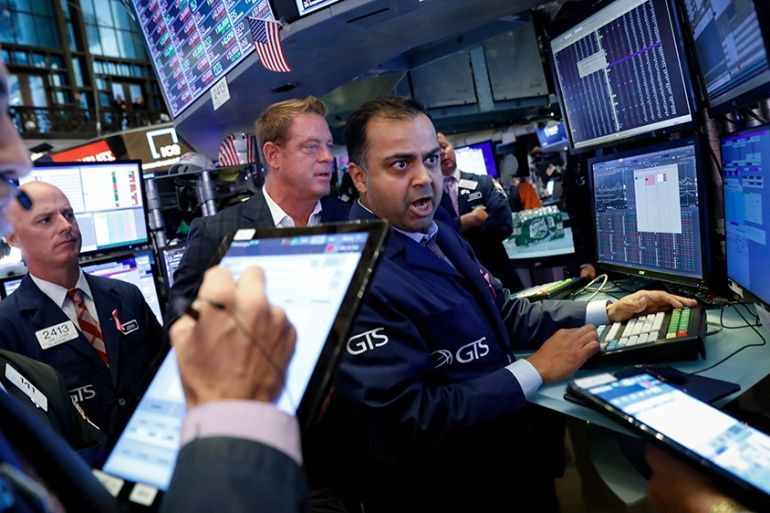More bad news on the US economy whipsaws stocks
A disappointing read on the services sector added to fears that trade wars are pushing the US economy toward recession.

After two consecutive days of global stock selloffs fueled by fears of recession, investors were hoping Thursday would deliver some good news on the United States economy.
They didn’t get it. But the news had a silver lining.
Keep reading
list of 4 itemsBiden slaps new tariffs on Chinese imports, ratcheting trade war
Former Binance CEO CZ sentenced to four months
Why is Japan’s yen falling and why is it so weak against the US dollar?
A weaker-than-expected reading on the US services sector compounded fears that the US economy – which has proven remarkably resilient as other major economies have stumbled – is showing signs of stress from business uncertainty fed by the trade wars waged by the administration of US President Donald Trump.
While the Institute for Supply Management’s non-manufacturing survey for September did not show the US services sector is contracting, the reading was significantly lower than what analysts had predicted. The disappointment added to concerns spawned by ISM’s survey of US manufacuturing released on Tuesday and showing that last month, factory activity in the US had hit its lowest level in a decade.
Taken together, the data paints a concerning picture that suggests the trade war between the US and China is feeding business uncertainty and pushing the world’s largest economy towards recession.
On Wall Street, the major indexes were slightly positive at the open, only to see shares sell off after the ISM data was released.
But by midday, stocks turned positive as investors wagered that the string of disappointing data would compel the US Federal Reserve to lower interest rates again this month.
Bets that the Fed will slash rates by a quarter of a percentage point at its next meeting at the end of October jumped to 92.5 percent on Thursday from 39.6 percent on Monday, according to CME Group’s FedWatch Tool.
“The degradation of the data, especially the non-manufacturing data, kind of pushes that to the Fed doing another cut,” said Kim Forrest, chief investment officer at Bokeh Capital Partners in Pittsburgh.
“This is very familiar to the post-2008 world where we get bad news and the market rallies because we are anticipating a rate cut.”
All eyes will now be on the pivotal US monthly jobs report released on Friday.
In European trading, investors priced in new US tariffs that are set to be imposed on $7.5bn of European goods.
Washington will enact 10 percent tariffs on Airbus planes and 25 percent duties on French wine, Scotch and Irish whiskeys and cheese from across the continent as punishment for illegal European Union subsidies to Airbus.
Recession fears helped push investors into the perceived safety of US bonds.
“The big question for a lot of folks is whether this is the third slowdown since the financial crisis or are we now heading for a global recession,” said Anujeet Sareen, a fixed income portfolio manager and global macro strategist for Brandywine Global.
Sareen said his base-case scenario was for a slowdown, but noted: “The wild card in the pack is always Donald Trump and whatever he tweets next.”
Asian shares had racked up losses earlier in the day. Japan’s Nikkei stock index closed down two percent, its biggest one-day decline since August 26.
“Risk aversion is broadly on the rise, and that has been triggered by the weakness in US manufacturing ISM data earlier this week,” said Manuel Oliveri, an FX strategist at Credit Agricole in London.
“The outperformance of the US economy compared to other major economies has held the dollar and other risky assets up, but that has changed this week.”